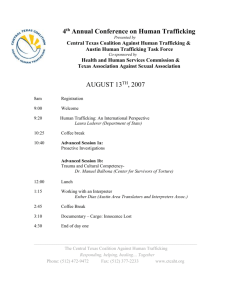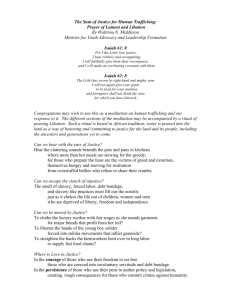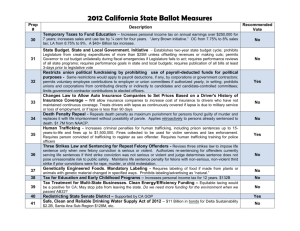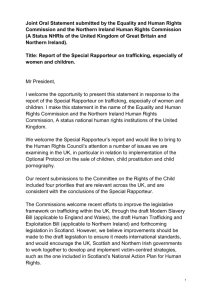Criminals or Victims? Non-Criminalisation of Victims of Human
advertisement
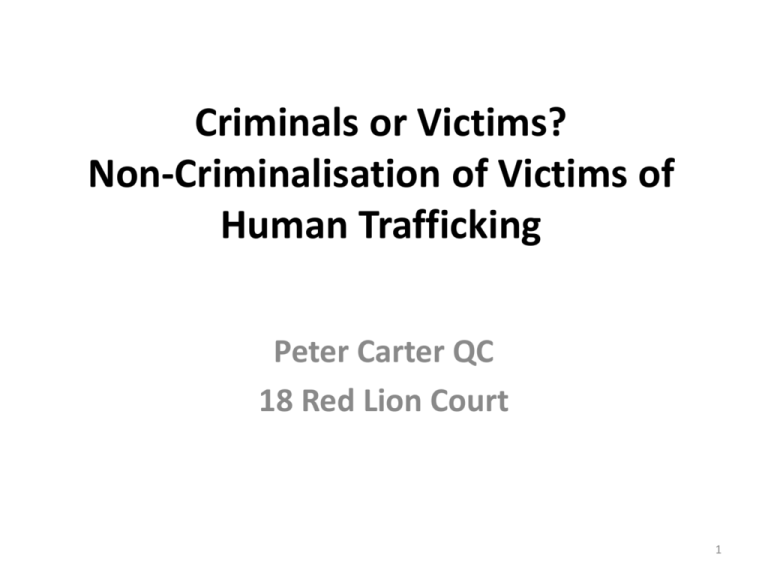
Criminals or Victims? Non-Criminalisation of Victims of Human Trafficking Peter Carter QC 18 Red Lion Court 1 Role & Possibilities of International Law Vienna Convention on the Interpretation of Treaties 1969 Article 18 - Obligation not to defeat the object and purpose of a treaty prior to its entry into force A State is obliged to refrain from acts which would defeat the object and purpose of a treaty when: (a) it has signed the treaty or has exchanged instruments constituting the treaty subject to ratification, acceptance or approval, until it shall have made its intention clear not to become a party to the treaty; or (b) it has expressed its consent to be bound by the treaty, pending the entry into force of the treaty and provided that such entry into force is not unduly delayed. 2 Trafficking as an international crime • The Rome Statute of the International Criminal Court includes “rape, sexual slavery and enforced prostitution” among the list of crimes against humanity by Art 7 (1) (g) and as a war crime by Art. 8 (2) (b) (xxii). Enslavement is a crime against humanity [Art 7 (1) (c)]. • Kunarac, IT-96-23 & 23/1-A, 12th June 2002 @ [115] to [124] • Both crimes against humanity and war crimes require there to be an armed conflict and for the offence to be “widespread and systematic” (crimes against humanity) or “part of a plan or policy or as part of a large-scale commission of such crimes” (war crimes). 3 Trafficking as an international crime • However, much trafficking will not be in the context of armed conflict. In some cases the opportunity for trafficking may result from displacement due to conflict. • Our courts should be alert to that possible background. 4 Reaction of Court of Appeal to these still novel arguments R v O : Sept 2008 [2008] EWCA Crim 2835 – Laura Cox J (leave); Laws LJ (Ct Appeal) • Use of international instruments as part of English law • Vienna Convention on Interpretation of Treaties. UK had signed but not ratified Council of Europe Trafficking Convention. Effect. Convention has subsequently been ratified by UK on 17th December 2008. 5 Reaction of Court of Appeal to these still novel arguments • R v LM – no “blanket immunity” – leave it to CPS • R v N; R v Le – Court was resistant to large amount of informative material. The Court adopted narrow interpretations of “trafficking” and “exploitation” and dealt with the appeal as an Art 6 ECHR issue. We argued that N should not have been prosecuted; that any trial was therefore unfair and the conviction unsafe. We lost. The Court refused to certify a question for the Supreme Court. The result – a challenge to a prosecutor’s decision is confined to abuse of process jurisdiction with all the limitations of that remedy. 6 Reaction of Court of Appeal (2) • Cf – different Court in Henderson [2010] EWCA Crim 1269 (baby shaking case) – Moses & Rafferty LJJ praised Michael Topolski QC for diligence & thoroughness of research & for breadth of material provided. • In R v Waya [2012] UKSC 51 @ [18]. [10] & [33] the Supreme Court declared that abuse of process is not the appropriate way to challenge prosecutors’ decisions that offend Convention rights. Lord Judge, CJ, was party to that decision having ruled the opposite in R v N. • R v T; R v L – Parosha’s cases – convictions quashed, reasons awaited (as at 30th May). Non-criminalisation • The defence of duress – See CPS Guide. It is an inappropriate test, especially for children. • No absolute immunity? There is an argument that there are offences so serious that it is disproportionate to allow trafficking to provide a complete defence. However, even in the gravest crimes, e.g. murder, there should be a procedure to reduce it to manslaughter where trafficking is a contributing factor. • Should any defence be confined to a “trafficking–related” offence; or to an offence committed as a consequence of the trafficking; or to one committed by a person who has been a victim of trafficking? 8 Non-criminalisation (2) • Moving from perpetrator to victim; cf child abuse cases. What is the appropriate threshold? Is the status of a defendant as a victim adequately addressed by mitigating sentence rather than by noncriminalisation? Is that really what Art. 26 means? • Art 8 EU Directive provides protection for victims amounting to immunity from prosecution. Why did the common law fail to do this? • Importance of victims as witnesses and identification at an early stage of an investigation. • What happens to victims afterwards? Deportation? Further trafficking? Death? 9 Non-criminalisation (3) • Should the decision about whether to prosecute be left to the discretion of a Prosecutor? Or • is it essential that the Court oversees the prosecutor’s decision to ensure it gives effect to the rights of victims of trafficking? • The required test is not that applied to abuse of process, nor is it the Wednesbury judicial review test. 10 Non-criminalisation – Conclusion • The consequence of Art 8 of the EU Directive which has direct effect in the UK and augments Art 26 of the Trafficking Convention and Art 4 ECHR is that a victim of trafficking has a right not to be prosecuted for an offence committed as a consequence of the trafficking. • It is not a test of proportionality. 11 Non-criminalisation – Conclusion (2) • The right must be protected by the courts. There is no room for restricting oversight of a prosecutor’s decision to the unduly restricted abuse of process jurisdiction – see the UK Supreme Court in R v Waya [2012] UKSC 51 @ [18]. [10] & [33] (in a different context). 12 Non-criminalisation – Conclusion (3) • Even where Art 8 does not apply, but the offence has a trafficking background (rather than cause or context), non-prosecution and leniency should be considered. That is the only role for proportionality. • The status of victims of trafficking must be protected by police and prosecutors using a rights-based approach, and the protection must be enforced by the courts as independent upholders of the rule of law. 13

